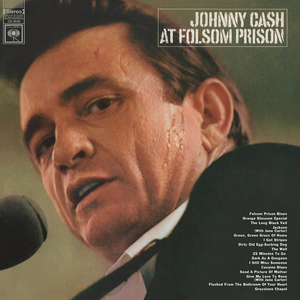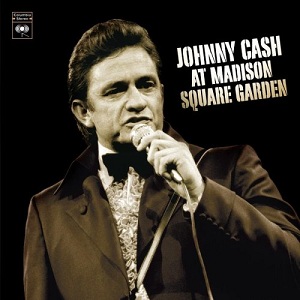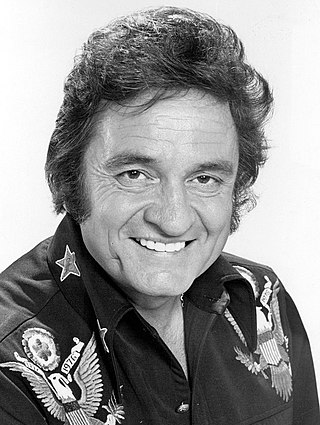Related Research Articles

Folsom is a city in Sacramento County, California, United States. The population was 80,454 at the 2020 census, up from 72,203 residents at the 2010 census.

Folsom California State Prison is a California State Prison in Folsom, California, United States, approximately 20 miles (32 km) northeast of the state capital of Sacramento. It is one of 34 adult institutions operated by the California Department of Corrections and Rehabilitation.

"Folsom Prison Blues" is a song by American singer-songwriter Johnny Cash, based on material composed by Gordon Jenkins. Written in 1953, it was first recorded and released as a single in 1955, and later included on his debut studio album Johnny Cash with His Hot and Blue Guitar! (1957), as the album's eleventh track. The song combines elements from two popular folk styles, the train song and the prison song, both of which Cash continued to use for the rest of his career. It was one of Cash's signature songs. Additionally, this recording was included on the compilation album All Aboard the Blue Train (1962). In June 2014, Rolling Stone ranked it No. 51 on its list of the 100 greatest country songs of all time.

Johnny Cash at San Quentin is the 31st overall album and second live album by American singer-songwriter Johnny Cash, recorded live at San Quentin State Prison on February 24, 1969, and released on June 16 of that same year. The concert was filmed by Granada Television, produced and directed by Michael Darlow. The album was the second in Cash's conceptual series of live prison albums that also included At Folsom Prison (1968), På Österåker (1973), and A Concert Behind Prison Walls (1976).

Johnny Cash at Folsom Prison is the first live album by American singer-songwriter Johnny Cash, released on Columbia Records on May 6, 1968. After his 1955 song "Folsom Prison Blues", Cash had been interested in recording a performance at a prison. His idea was put on hold until 1967, when personnel changes at Columbia Records put Bob Johnston in charge of producing Cash's material. Cash had recently controlled his drug abuse problems, and was looking to turn his career around after several years of limited commercial success. Backed by June Carter, Carl Perkins, and the Tennessee Three, Cash performed two shows at Folsom State Prison in California on January 13, 1968. The initial release of the album consists of fifteen songs from the first show and two from the second.
Western music is a form of music composed by and about the people who settled and worked throughout the Western United States and Western Canada. Western music celebrates the lifestyle of the cowboy on the open range, along the Rocky Mountains, and among the prairies of Western North America. The genre grew from the mix of cultural influences in the American frontier and what became the Southwestern United States at the time, it came from the folk music traditions of those living the region, those being the hillbilly music from those that arrived from the Eastern U.S., the corrido and ranchera from Northern Mexico, and the New Mexico and Tejano endemic to the Southwest. The music industry of the mid-20th century grouped the western genre with that of similar folk origins, instrumentation and rural themes, to create the banner of country and western music, which was simplified in time to country music.

Inside the Walls of Folsom Prison is a 1951 American film noir crime film directed by Crane Wilbur and starring Steve Cochran and David Brian. Set in Folsom State Prison in California, the film was seen both in the United States and Europe.

Blood, Sweat and Tears is the fifteenth album by singer Johnny Cash, released on January 7, 1963. It is a collection of songs about the American working man. This includes "The Legend of John Henry's Hammer" and "Busted", the latter of which would become a single. Both would also be performed by Cash during his famous 1968 concerts at Folsom Prison and be included in the 1999 extended reissue of the album, At Folsom Prison. The album was included on the Bear Family Records box set Come Along and Ride This Train.
Luther Monroe Perkins, Jr. was an American country music guitarist and a member of the Tennessee Three, the backup band for singer Johnny Cash. Perkins was an iconic figure in what would become known as rockabilly music. His creatively simple, sparsely embellished, rhythmic use of Fender Esquire, Jazzmaster and Jaguar guitars is credited for creating Cash's signature "boom-chicka-boom" style.

Johnny Cash at Madison Square Garden is a 1969 recording of a Johnny Cash concert at Madison Square Garden. It was released in 2002.
Glen Milborn Sherley was an American who became a country singer-songwriter after his song "Greystone Chapel" was made famous by Johnny Cash in 1968. Sherley wrote the song while in prison and it was later performed by Cash at his Folsom Prison performance, which was eventually released as the album At Folsom Prison. Sherley was in the front row, unaware that his song was going to be performed.
"Dark as a Dungeon" is a song written by singer-songwriter Merle Travis. It is a lament about the danger and drudgery of being a coal miner in a shaft mine. It has become a rallying song among miners seeking improved working conditions.

The Jedediah Smith Memorial Trail is a paved multi-use pathway that runs between the confluence of the Sacramento River with the American River, just north of downtown Sacramento, California, and Beal's Point at Folsom Lake, north of Folsom. The trail is 32 miles (51 km) long, and is used as a major recreational destination, as well as a commuter artery for cyclists. The trail is considered one of the longest paved purpose-built bike trails in the country. The trail is maintained by the County of Sacramento and is painted with mile markers placed at every half-mile increment.

Johnny Cash Sings the Ballads of the True West is a concept double album and the 22nd overall album released by country singer Johnny Cash, released on Columbia Records in 1965. Covering twenty individual songs, the album, as its title suggests, contains various ballads and other songs on topics related to the history of the American Old West. This includes Carl Perkins' "The Ballad of Boot Hill", "Streets of Laredo", and the sole single from the album, "Mr. Garfield", describing the shock of the population after the assassination of President James Garfield. One of the songs, "25 Minutes to Go", would later be performed at Folsom Prison and appear on Cash's famous At Folsom Prison recording in 1968, while the melody of "Streets of Laredo" would be recycled for the song "The Walls of a Prison" featured on Cash's album From Sea to Shining Sea.

Dressed in Black: A Tribute to Johnny Cash is, as the title suggests, a tribute album to country singer Johnny Cash, released on the Dualtone label on September 17, 2002. It features several of Cash's most well-known songs, such as "Ring of Fire" and "Folsom Prison Blues", as well as a number of more obscure compositions like "I'm Gonna Sit on the Porch and Pick on My Old Guitar" and "Pack Up Your Sorrows". Various artists contributed cover versions to the album; these include Hank Williams III, The Reverend Horton Heat and Raul Malo, but the focus is primarily on less popular artists, as opposed to Kindred Spirits, the second tribute album released around the same time.

The American River Parkway is a 32-mile (51 km) urban regional recreation area that runs along the American River throughout Sacramento County, California, consisting of many smaller parks and boat launching points. It can be accessed by various exits off U.S. Route 50 in Sacramento County. Levees line the river to prevent flooding of developed areas.

John R. Cash was an American singer-songwriter. Most of Cash's music contains themes of sorrow, moral tribulation, and redemption, especially songs from the later stages of his career. He was known for his deep, calm, bass-baritone voice, the distinctive sound of his backing band, the Tennessee Three, that was characterized by its train-like chugging guitar rhythms, a rebelliousness coupled with an increasingly somber and humble demeanor, and his free prison concerts. Cash wore a trademark all-black stage wardrobe, which earned him the nickname "Man in Black".

Koncert v Praze (1983) is an album by American country singer Johnny Cash.

Aphonopelma johnnycashi is a species of tarantula. It was found in 2015 near Folsom Prison in California and named after Johnny Cash, whose song "Folsom Prison Blues" made the prison famous. Mature males are generally black, and the country music singer was also known as "The Man in Black".

Thomas Gabriel is an American singer and songwriter. Gabriel's music has been described as a mix of Americana/Roots with a hint of country and rock. He is the eldest grandchild of singer and actor Johnny Cash.
References
- 1 2 "Johnny Cash Trail | Folsom". Folsom Cash Art Trail. Retrieved December 10, 2024.
- ↑ Weber, Lindsay (November 22, 2024). "New sculpture along Folsom trail pays tribute to Johnny Cash". KCRA. Retrieved December 10, 2024.